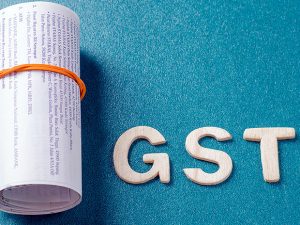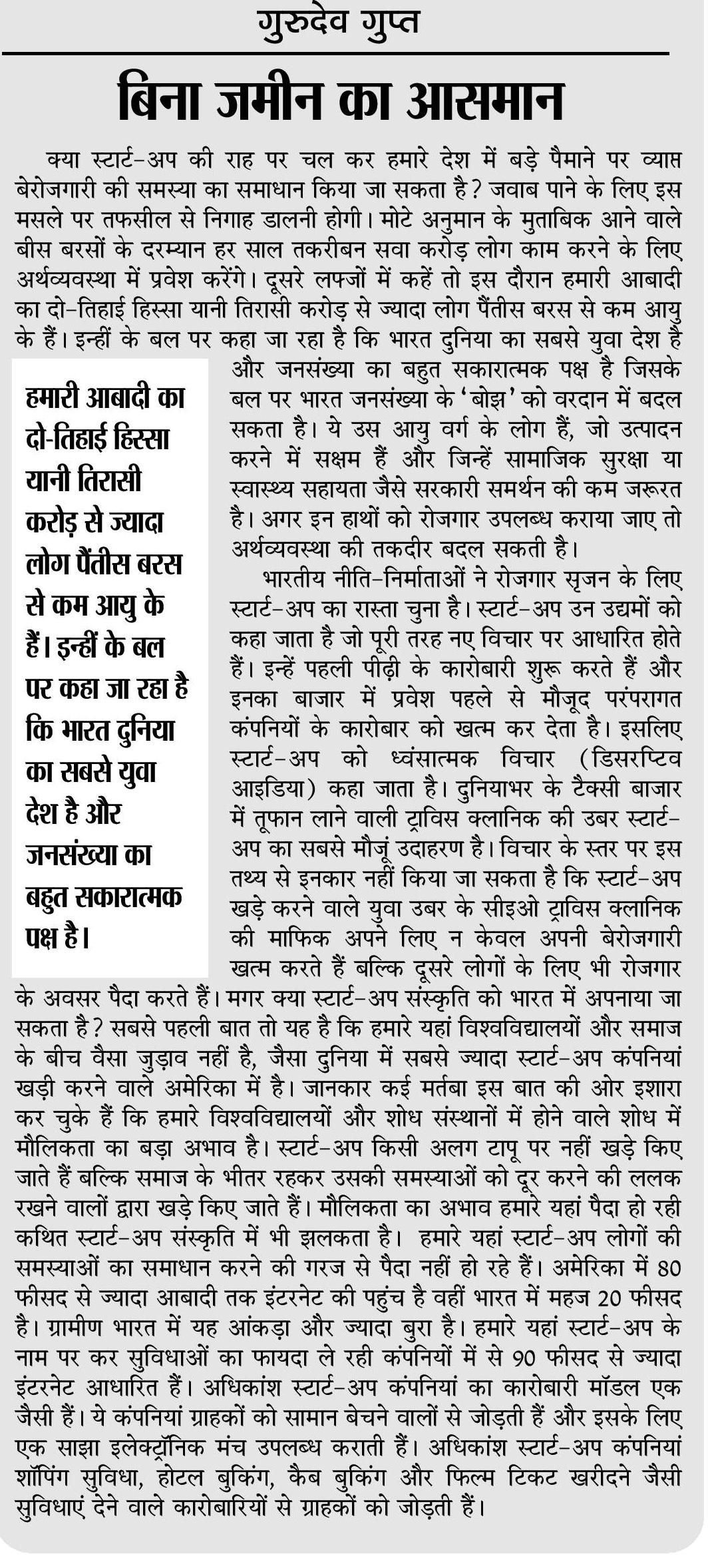
03-07-2017 (Important News Clippings)
To Download Click Here.
GST: Biggest move to end black money

Rightly, the PM billed this as a good and simple tax that would subsume and eliminate the previous cascade of 17 central and state taxes and 23 cesses, leading to efficiency gains and lowering retail prices. The audit trails the levy creates would curb evasion, widen the tax base and boost collections, both in indirect and direct taxes. The GST network that provides the IT infrastructure for taxpayers to pay tax, file returns and claim refunds, without having to interface with a tax official, except if taken up for audit and scrutiny, is a major innovation.
Sensibly, businesses have been given more time to file returns in the first two months. This will make the transition smooth: companies need time to recast their accounting systems for full compliance. Compliance should be easy, and taxpayers must not be harassed having to deal with two sets of administrative bureaucracies for the tax. Industry’s fear that the anti-profiteering clause may be a perverse incentive to routinely suspect the pricing policy of producers is not misplaced. It must have a sunset clause. An institutional mechanism to assess the experience of GST as it rolls out to make swift course correction makes sense.Ideally, we should have started with low rates, achieved compliance and acquiescence, and pushed rates up gradually. Multiple rates are not inherently inimical to GST but make administration a little complicated. It is still possible to reduce the rates and the number of rates, as government gathers experience implementing the new tax.
Date:03-07-17
Last hurdle: Opaque political funding must change

The goods and services tax will create multiple audit trails that will lead the taxman to undisclosed income. Tax rates have moderated and will moderate further. The government will take strong punitive measures against tax evaders. The PM ticked all the right boxes. Except one.
The element of the black economy he failed to mention is not the largest but is of the most consequence. This is political funds. Spending on political activity has soared, rising faster than per capita income. However, the bulk of political expenditure remains off the books, and so, naturally, does most of the funding that finances the expenditure.Today, industry funds individual politicians, who amass war chests, out of which they dole out money to followers, supporters and activists, apart from to the party to which they hold allegiance. Much remains with the politicians, after meeting their political expenses. This builds personal fortunes of politicians. Unless this system is replaced with one of transparent accounting of political income and expenditure, corruption and black money cannot be eliminated.The politician will turn a blind eye to the black money generated to fund his coffers, and to the misuse of the state machinery/banking system to generate the unaccounted funds in question. This, too, must change.
End privileges
Karnataka Speaker moving to jail journalists is a clear misuse of extraordinary powers
TOI Editorials
In recognition of the importance of freedom of expression, the Karnataka high court has intervened after KB Koliwad, Speaker of the legislative assembly, authorised harsh punishment of one-year imprisonment and Rs 10,000 fine on two journalists Ravi Belagere, Editor of Hi Bangalore and Anil Raj, editor and publisher of Yelahanka Voice, for allegedly writing defamatory articles against three legislators. The court has told the Speaker to reconsider the arrest order and find an acceptable solution to end the crisis. Using extraordinary breach of privilege powers granted to it, originally intended to insulate functioning of elected assemblies from extraneous pressures but now proven to be far in excess of that function, the privileges committee report recommended punishment for Raj and Koliwad extended it to hand prison terms to both journalists.
As it turns out, Belagere had written a scathing article against Koliwad and the complaint against him was filed by Koliwad himself when he became chairman of the privileges committee in 2015-16. If the articles published were defamatory in nature, then the concerned legislators have the right to approach the judiciary and seek redress by filing a case. In contrast, under the garb of breach of privilege, gross misuse of special powers has taken place.
The Editors’ Guild of India had strongly condemned the Speaker’s decision and the Karnataka government rightly distanced itself from the issue by deferring the arrest of the two journalists. But the legislature walks a thin line as there is no law codifying these privileges. It’s high time not only to let the journalists go, but also to end discretionary powers that enable politicians to become judge, jury and executioner themselves.
Date:03-07-17
Force multiplier
GST is just the beginning, reform to truly unshackle the Indian economy
TOI Editorials
The midnight session in Parliament which marked India’s transition to Goods and Services Tax (GST) was reminiscent of a similar occasion on the eve of India’s Independence. While the two instances are not comparable, ushering in GST is a landmark achievement. It took a combined effort by India’s political parties to set aside narrow interests in the pursuit of greater common good to bring about this reform. However, switching over to GST should not be seen as an end in itself. Instead it should be seen as the beginning of a process of reform to truly unshackle the Indian economy.
GST, as originally envisaged, was meant to accomplish two things. Multiple indirect taxes were to be compressed into a single tax, which would bring about simplicity in a messy system. Simultaneously, fiscal barriers between states were to be dismantled to stitch together a common market. Long lines of trucks waiting at checkposts to cross state boundaries, a symbol of a fragmented economic architecture which encouraged corruption, were to be eliminated. According to some estimates, this would have added up to 1.5% to annual GDP growth.
In practice, what has emerged is a diluted version of the original idea as a successful conclusion to a tortuous negotiation needed compromises. Therefore, the GST Council which will now oversee the new tax architecture must focus initially on stabilising the system and then improving on the current design to take it closer to the ideal. A simple and straightforward GST would lead to doing business getting easier, triggering increased economic activity and job creation while reducing corruption and tax evasion.
GST is a landmark step as it has the potential to catalyse changes in many other areas. One of the benefits is expected to be a favourable environment for Indian manufacturing and ‘Make in India’, taking the country on the path to industrialisation. But this path requires other reforms. Here, Prime Minister Narendra Modi should build on the government’s impressive work on forging a consensus to actualise GST. Industrialisation, for instance, is a pre-condition to absorb surplus from the struggling rural economy. It is the only way India’s farm crisis can really be resolved. If this is to come about we need more instances of political consensus to reform factors of production such as land and labour. Bringing about these changes therefore should be the Modi government’s priority now.
जीएसटी : अच्छा और सहज
संपादकीय
आखिरकार देश ने वस्तु एवं सेवा कर (जीएसटी) व्यवस्था को अंगीकृत कर ही लिया। संसद के केंद्रीय कक्ष में एक भव्य समारोह में आजादी के बाद के सबसे बड़े कर सुधार का शुभारंभ किया गया। हालांकि कांग्रेस समेत कई विपक्षी दल इस समारोह में शामिल नहीं हुए। लेकिन इसमें दो राय नहीं कि जीएसटी देश के आर्थिक इतिहास की एक अहम परिघटना है। इस बात से भी इनकार नहीं किया जा सकता है कि प्रधानमंत्री नरेंद्र मोदी और वित्त मंत्री अरुण जेटली ने अपने-अपने भाषण में इसे भारतीय राजनीति का एक अहम मोड़ और संघीय ढांचे की सफलता का बढिय़ा उदाहरण बताया। विजय केलकर की अध्यक्षता वाले एक कार्यबल ने 2003 में पहली बार जीएसटी का विचार रखा था। अटल बिहारी वाजपेयी के नेतृत्व वाली राजग सरकार ने उन अनुशंसाओं का स्वागत किया था। बाद में कांग्रेसनीत संप्रग सरकार ने वर्ष 2011 में इसे लेकर ठोस कदम उठाए। वक्त बीतने के साथ तमाम दलों ने पार्टी लाइन से परे जाकर इसमें योगदान किया। भाजपा के यशवंत सिन्हा ने जीएसटी परिषद का प्रारूप बनाने वाली संसदीय समिति की अध्यक्षता की। कई विपक्षी नेताओं ने राज्यों के वित्त मंत्रियों के अधिकार प्राप्त समूह का नेतृत्व किया। इनमें पश्चिम बंगाल से माकपा के असीम दासगुप्ता, केरल कांग्रेस (एम) के के एम मणि तथा जम्मू कश्मीर से नैशनल कॉन्फ्रेंस के ए आर राथेर शामिल थे। बहरहाल, 14 साल की लंबी प्रतीक्षा के बाद आखिरकार जीएसटी परिषद के सभी निर्णयों पर सहमति बन गई।




